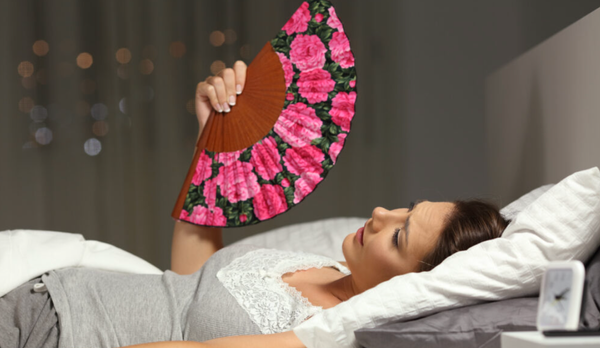Sleep expert reveals how to stay cool on hot nights - and what to avoid





The UK is facing its fourth heatwave of the summer, with the Met Office revealing temperatures will peak at highs of 34C in parts of England on Tuesday.
As Britons all over the country look to stay cool at night, Ashley Hainsworth, managing director at Bed Kingdom, shares their advice to prevent overheating and get a good night's sleep during hot nights.
Avoid strenuous exercise, alcohol, and spicy food
Strenuous exercise before bed gets your blood pumping and keeps your heart rate and body temperature up. This will keep your body temperature warm and prevent you from cooling down as you try to nod off.
"This also includes sexual activity - and is best avoided when the temperature is high", says Hainsworth.
"It’s best to exercise in the morning when temperatures tend to be cooler".
Alcohol will make your body feel hot as it tries to manage alcohol consumption.
While your body is not actually heating up, it will feel like it and may prevent you from feeling cool and comfortable in bed.
Spicy food often contains capsaicin, the active ingredient in hot peppers, which can increase your body temperature and interrupt your sleep.
Ashley adds, "Eating spicy food before you go to bed may give you indigestion, making it difficult to feel able to drift off as your body battles discomfort".
Target your body's quick-cooling spots
To cool down your whole body, you need to reduce your core temperature.
Ashley says targeting your body's extremities will speed up the cooling process.
"Your feet, head, wrists, neck, and ankles, anywhere there's a pulse point, are key areas to focus on," says Ashley.
Applying ice or a cold compress to these points will help to lower body heat before you drift off to sleep.
Turn off unnecessary electronics before bed
Electronic devices such as computers, games consoles, and TVs can get hot after use.
The excess heat will leave rooms, especially smaller ones, feeling stuffy and heat-trapped.
Ashley recommends turning them off at least one hour before going to bed.
"British homes are designed to keep the heat in, and rooms with a build-up need time for the heat to escape".
Switch to breathable bedding – and avoid these fabrics
Your bedding may not be breathable enough for the summer months.
Cooling bed sheets should wick moisture away from your body and help to regulate your core temperature.
Cotton is one of the more popular fabrics for bedding as it is breathable and versatile. It can keep you cool on hot summer nights and warmer in winter, depending on the weaving and thread count.
Cooling cotton sheets are typically between a thread count of 250 and 300, and should not be more than 500.
"Cotton is also durable enough to last for years of use", says Ashley.
Linen fabrics can keep you cool at night. Bed linen can absorb a fifth of its weight before beginning to feel damp, making it an effective choice to keep the fabric fresh if you often get hot at night. This fabric type is less likely to stick to your body.
Bamboo fabric has become popular over the years as it is an eco-friendly alternative to synthetics. It can be more breathable than cotton, and the natural, soft, and durable material is a good choice for allergy sufferers.
Eucalyptus sheets, like bamboo, are another eco-friendly option made of natural materials, which can effectively wick moisture and stay breathable all night. It can dry quickly, deter dust mites, and is hypoallergenic.
Ashley says to avoid synthetic microfibre bedding in hot weather.
"Many people choose microfibre bedding as it is a low-cost option. However, it is made from synthetic fibres that aren’t very breathable. Other fabrics to avoid during the summer are polyester, nylon, rayon, and silk".
Have a light meal for dinner - avoid heavy fats and carbs
Eating a meal too close to your bedtime can be harmful to your sleep. The more food you eat, the more uncomfortable you may feel.
Heavy meals tend to be high in fats and carbohydrates, which take more energy for your body to break down.
This could lead to feeling bloated and uncomfortable when trying to sleep at night.
Ashley recommends a minimum three-hour window between eating and sleeping.
Opting to eat fats and carbohydrates earlier in the day, and eating a light meal at night, will require less from your body while you drift off, as it has done the work to break food down earlier in the day.
Take a shower before bed
It’s a great feeling to wash the day away and then climb into fresh bed sheets at night.
Showers can help to regulate our body temperature, which can ease us into a peaceful sleep.
When it’s hot, a lukewarm shower can cool your core temperature down. A cool shower can be more beneficial than a hot shower to help you fall asleep faster.
But Ashley warns that cold showers might actually be counterproductive.
"Your body will try to conserve heat, keeping you hotter for longer. Try to avoid showering at extreme temperatures and stick to warm or tepid water," Ashley warns.